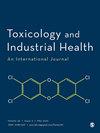Assessment of genotoxicity biomarkers in gasoline station attendants due to occupational exposure
IF 1.7
4区 医学
Q3 PUBLIC, ENVIRONMENTAL & OCCUPATIONAL HEALTH
引用次数: 0
Abstract
Gasoline station attendants are exposed to numerous chemicals that might have genotoxic and carcinogenic potential, such as benzene in fuel vapor and particulate matter and polycyclic aromatic hydrocarbons in vehicle exhaust emission. According to IARC, benzene and diesel particulates are Group 1 human carcinogens, and gasoline has been classified as Group 2A “possibly carcinogenic to humans.” At gas stations, self-service is not implemented in Turkey; fuel-filling service is provided entirely by employees, and therefore they are exposed to those chemicals in the workplace during all working hours. Genetic monitoring of workers with occupational exposure to possible genotoxic agents allows early detection of cancer. We aimed to investigate the genotoxic damage due to exposures in gasoline station attendants in Turkey. Genotoxicity was evaluated by the Comet, chromosomal aberration, and cytokinesis-block micronucleus assays in peripheral blood lymphocytes. Gasoline station attendants ( n = 53) had higher tail length, tail intensity, and tail moment values than controls ( n = 61). In gasoline station attendants ( n = 46), the frequencies of chromatid gaps, chromosome gaps, and total aberrations were higher compared with controls ( n = 59). Increased frequencies of micronuclei and nucleoplasmic bridges were determined in gasoline station attendants ( n = 47) compared with controls ( n = 40). Factors such as age, duration of working, and smoking did not have any significant impact on genotoxic endpoints. Only exposure increased genotoxic damage in gasoline station attendants independently from demographic and clinical characteristics. Occupational exposure-related genotoxicity risk may increase in gasoline station attendants who are chronically exposed to gasoline and various chemicals in vehicle exhaust emissions.评估加油站服务员因职业暴露而产生的基因毒性生物标志物
加油站服务员会接触到许多可能具有遗传毒性和致癌性的化学物质,如燃料蒸汽和微粒物质中的苯,以及汽车尾气中的多环芳烃。根据国际癌症研究机构的资料,苯和柴油微粒属于 1 类人类致癌物,汽油被列为 2A 类 "可能对人类致癌"。土耳其的加油站不实行自助服务,加油服务完全由员工提供,因此他们在所有工作时间都会在工作场所接触到这些化学物质。对职业暴露于可能的基因毒性物质的工人进行基因监测,可以及早发现癌症。我们的目的是调查土耳其加油站服务员因接触这些物质而受到的遗传毒性损害。我们采用彗星试验、染色体畸变试验和细胞因子阻断微核试验来评估外周血淋巴细胞的遗传毒性。与对照组(61 人)相比,加油站员工(53 人)的尾长、尾强度和尾矩值都更高。与对照组(n = 59)相比,加油站工作人员(n = 46)的染色体间隙、染色体间隙和总畸变频率更高。与对照组(40 人)相比,加油站服务员(47 人)的微核和核质桥频率增加。年龄、工作时间和吸烟等因素对基因毒性终点没有明显影响。只有接触才会增加加油站服务员的基因毒性损伤,而与人口统计学和临床特征无关。长期接触汽油和汽车尾气中各种化学物质的加油站服务员,其与职业接触相关的遗传毒性风险可能会增加。
本文章由计算机程序翻译,如有差异,请以英文原文为准。
求助全文
约1分钟内获得全文
求助全文
来源期刊
CiteScore
3.50
自引率
5.30%
发文量
72
审稿时长
4 months
期刊介绍:
Toxicology & Industrial Health is a journal dedicated to reporting results of basic and applied toxicological research with direct application to industrial/occupational health. Such research includes the fields of genetic and cellular toxicology and risk assessment associated with hazardous wastes and groundwater.

 求助内容:
求助内容: 应助结果提醒方式:
应助结果提醒方式:


